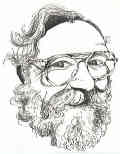Why Pandora?
This poem, which tells the story of the discovery and naming of asteroid 55 Pandora on September 10th 1858, is an attempt to answer one of the questions that have always bothered me: what makes an astronomer looks at a lump of bobbing rock, and go "Ah, Aphrodite!"?
The legend of Pandora was the bulk of the background reading for this piece, and it's an interesting tale. Look into it for yourself during an idle moment. I was particularly intrigued by the big philosophical problem of the story: what was Hope doing in a jarful of curses? Was it a compensation package from the Gods, or their final curse?
This poem was broadcast on BBC Radio Wales Roy's Rarebits on September 10 2006.
Why Pandora?
George Mary Searle, Astronomer and Clergyman,
Gazed into the spangling heavens and found Pandora!
Rather large, as small things go, and very bright,
She sailed in a sea of her sister asteroids
On a five year celestial circuit.
Because he found her, he named her,
After the first woman,
The curse and gift of the Gods.
Why?
What made him think she was squeezed into a ball of star-stuff
By the skilful hands of Hephaestus;
That Aphrodite clothed her in twinkling beauty?
Did he feel, as an astrological undertow,
That as she glided towards us we would hear her
Singing with the music of the spheres:
Or that a healing miasma would bathe us,
And every garden burst into a riot of fecundity
As she reached her periapsis?
Or did he fear, as she skimmed away,
That she would leave in her wake
All the evils that her jar contained:
That waves of plague, sorrow, poverty and despair
Would deluge the timorous world.
Or, finally, did he name her for what she gave him:
Hope,
Her last gift/curse to mankind.
For he had found her,
One tiny lump of rock
Lost and adrift
In an ocean of sky:
And did he carry on hoping
That one day he would find another of her sisters,
Though until the end of his days
He never did.
The legend of Pandora was the bulk of the background reading for this piece, and it's an interesting tale. Look into it for yourself during an idle moment. I was particularly intrigued by the big philosophical problem of the story: what was Hope doing in a jarful of curses? Was it a compensation package from the Gods, or their final curse?
This poem was broadcast on BBC Radio Wales Roy's Rarebits on September 10 2006.
Why Pandora?
George Mary Searle, Astronomer and Clergyman,
Gazed into the spangling heavens and found Pandora!
Rather large, as small things go, and very bright,
She sailed in a sea of her sister asteroids
On a five year celestial circuit.
Because he found her, he named her,
After the first woman,
The curse and gift of the Gods.
Why?
What made him think she was squeezed into a ball of star-stuff
By the skilful hands of Hephaestus;
That Aphrodite clothed her in twinkling beauty?
Did he feel, as an astrological undertow,
That as she glided towards us we would hear her
Singing with the music of the spheres:
Or that a healing miasma would bathe us,
And every garden burst into a riot of fecundity
As she reached her periapsis?
Or did he fear, as she skimmed away,
That she would leave in her wake
All the evils that her jar contained:
That waves of plague, sorrow, poverty and despair
Would deluge the timorous world.
Or, finally, did he name her for what she gave him:
Hope,
Her last gift/curse to mankind.
For he had found her,
One tiny lump of rock
Lost and adrift
In an ocean of sky:
And did he carry on hoping
That one day he would find another of her sisters,
Though until the end of his days
He never did.


0 Comments:
Post a Comment
<< Home